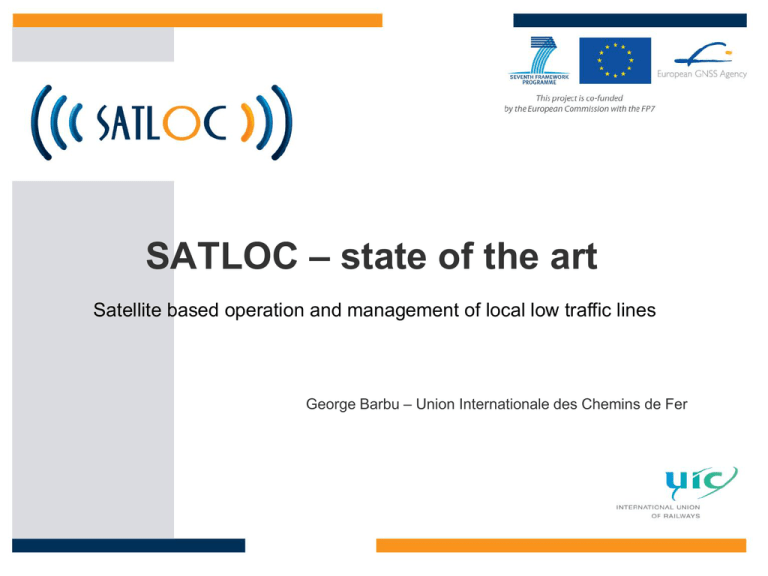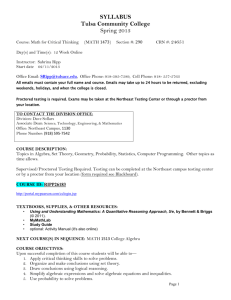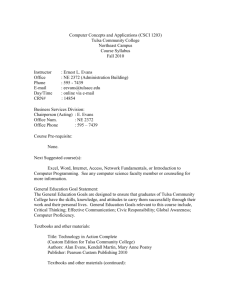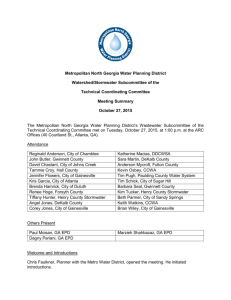SATLOC-PPT
advertisement

SATLOC – state of the art Satellite based operation and management of local low traffic lines George Barbu – Union Internationale des Chemins de Fer The essential questions for signaling: Where is my train? Which speed? Which time? ETCS principle: balise-referenced position EGNOS and the future GALILEO are civil systems, operated by civilians and under civil political control. They are designed specifically for civil use and satisfy requirements that emerged from consultations with many different user groups. Railways have included their requirements in the HLD - MRD Results after tests in the railway environment • Accuracy: 4-6 m; <1m with augmentation; 2-5 cm with RTK or LRK techniques • Coverage: total is possible with sensors, but accuracy degrades on long dark zones • Integrity: 2,5.10^-7, but in railways this maybe not always sufficient for the highest integrity applications • Perror<10^-9 is possible with additional sensors (e.g. Route Map) Aim and objectives • Aim: proof of evidence that GNSS based absolute train location and speed determination is compliant with requirements for signaling and with train control functions (ETCS) • Objectives: – Live demonstration on LTL of train control, full speed supervision, traffic control and traffic management based on GNSS – concrete technical solution based on industry supply – Proof of feasibility of using carrier independent communication (use of public networks @ marginal cost) – Full specifications of Concept, ORS, FRS, ARS, SRS and methodology for validation and certification – Reference methodology for performance and safety (until SIL4) assessment of GNSS based absolute positioning – Economic evaluation, proof of concept export on any railway line – Migration strategy to ETCS: GNSS-based train end localization (train integrity) level 3 with full interoperability with ERTMS Regional High innovation – close loop control Accreditation of innovatation change of mentality PVT(n+1) Train and TCC control reciprocally -Train sends each 5 s PVT -TCC real time emulates the train run under the MA data -Train OBC executes the MA -If MA execution fails, TCC sends EB High operational safety is enabled by this reciprocal control when both OBC and TCC are qualified at minimum SIL 2 Route map data Expected (x;y) at n+1 PVT (n) Nonassessed Continue Assessed warning Exceed α Route map static line profile Train PVT (n) assessed Wait α cycles Train data Calculate dynamic speed profile and SBIP, then EBIP Advantage: low cost on highest operational safety 7 Matches (ἐ) xy(n+1) continue Warning then EB order Active MAL XY Matches calculated data SATLOC reference architecture Brake & traction TIU KERNEL RFID position check DMI GNSS odometry Route map onboard RADIO INTERFACE (EURORADIO) EDOR Data: VPN over UMTS (3G..) Voice CAB radio 3G… RFID Tags Route map Euroradio Traffic controller interface Simplified interlocking / LC TCC-RBC TCC-RBC RBC + traffic control center Trackside Results @ date • All specifications are concluded – available on the UIC SATLOC extranet and on the EC/GSA project site • Technical design of the pilot line is ended • Three equipment sets are completely provided • Software products are validated • Two running trains are fully equipped 10 Results @ date • Test specifications are elaborated and agreed with the user and the CFR Safety Authority and Notified Body – full flexibility for safe adapted use is available • TCC (RBC) center in Zarnesti is operational • The train – TCC mobile data and voice connections are operational: - - Via VPN-Secured link for data transmission in GPRS 3G / 4G coverage is also available (full IP, VPN based on the SEC-IP-VPN protocols in the VODAFONE Network – second provider OTENET is prepared for full availability) - Voice over other channels (normal 3G/4G) in a different VPN for secure availability of transmission • Real scale tests with running trains have successfully ended • Validation, certification and commissioning are ongoing 11 12 13 14 TCC operational equipment 15 Route map – place of virtual balises – equipment with spring switches – example stations Rasnov and Cristian 16 17 Successful introduction of the new technology in the railway safety needs accreditation of new mode of thinking, demonstration of operational safety, innovation, convincing demonstration of concept and lifting of technical and mentality barriers. You are welcome to SEE that it works 18





















